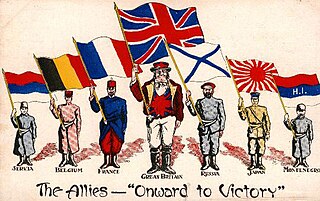Related Research Articles
Nationalism is an idea and movement that holds that the nation should be congruent with the state. As a movement, it tends to promote the interests of a particular nation, especially with the aim of gaining and maintaining the nation's sovereignty (self-governance) over its homeland to create a nation-state. It holds that each nation should govern itself, free from outside interference (self-determination), that a nation is a natural and ideal basis for a polity, and that the nation is the only rightful source of political power. It further aims to build and maintain a single national identity, based on a combination of shared social characteristics such as culture, ethnicity, geographic location, language, politics, religion, traditions and belief in a shared singular history, and to promote national unity or solidarity. Nationalism, therefore, seeks to preserve and foster a nation's traditional culture. There are various definitions of a "nation", which leads to different types of nationalism. The two main divergent forms are ethnic nationalism and civic nationalism. Historically, since the beginnings, the civic type of nationalism was the determinant factor in the development and spread of modern constitutional and democratic value system in the societies, however the ethnic nationalism has a tendency to prefer authoritarian rule or even dictature.

Chinese nationalism is a form of nationalism in the People's Republic of China and the Republic of China on Taiwan which asserts that the Chinese people are a nation and promotes the cultural and national unity of all Chinese people. It is often equated with Han nationalism, although these two concepts are different. According to Sun Yat-sen's philosophy in the Three Principles of the People, Chinese nationalism should be a form of civic nationalism constructed on top of a united value, however this has not been fully recognized or applied in practice by successors.

Democratization, or democratisation, is the transition to a more democratic political regime, including substantive political changes moving in a democratic direction. It may be a hybrid regime in transition from an authoritarian regime to a full democracy, a transition from an authoritarian political system to a semi-democracy or transition from a semi-authoritarian political system to a democratic political system. The opposite process is known as democratic backsliding or autocratization.

New Confucianism is an intellectual movement of Confucianism that began in the early 20th century in Republican China, and further developed in post-Mao era contemporary China. It primarily developed during the May Fourth Movement. It is deeply influenced by, but not identical with, the neo-Confucianism of the Song and Ming dynasties.

Political culture describes how culture impacts politics. Every political system is embedded in a particular political culture.
Economic nationalism, also called economic patriotism and economic populism, is an ideology that favors state interventionism over other market mechanisms, with policies such as domestic control of the economy, labor, and capital formation, including if this requires the imposition of tariffs and other restrictions on the movement of labor, goods and capital. The core belief of economic nationalism is that the economy should serve nationalist goals.

National identity is a person's identity or sense of belonging to one or more states or to one or more nations. It is the sense of "a nation as a cohesive whole, as represented by distinctive traditions, culture, and language". National identity may refer to the subjective feeling one shares with a group of people about a nation, regardless of one's legal citizenship status. National identity is viewed in psychological terms as "an awareness of difference", a "feeling and recognition of 'we' and 'they'". National identity also includes the general population and diaspora of multi-ethnic states and societies that have a shared sense of common identity identical to that of a nation while being made up of several component ethnic groups. Hyphenated ethnicities are an example of the confluence of multiple ethnic and national identities within a single person or entity.
Democratic Front or the Maha Aghadi is name of the former governing coalition in the Indian state of Maharashtra. The Alliance of Indian National Congress and Nationalist Congress Party was called as Maha Aghadi.
Opposition to immigration, also known as anti-immigration, has become a significant political ideology in many countries. In the modern sense, immigration refers to the entry of people from one state or territory into another state or territory in which they are not citizens. Illegal immigration occurs when people immigrate to a country without having official permission to do so. Opposition to immigration ranges from calls for various immigration reforms, to proposals to completely restrict immigration.
Secular Progressive Alliance, formerly known as Democratic Progressive Alliance, is an alliance of Indian political parties formed by the Dravida Munnetra Kazhagam (DMK).
Amrita Basu is an American academic and political scientist. She currently is a professor at Amherst College where she holds affiliations in the departments of Political Science, Sexuality, Women's, & Gender Studies, Asian Languages & Civilizations, and Black Studies.

Peter Hays Gries is the Lee Kai Hung Chair and founding Director of the Manchester China Institute at the University of Manchester, where he is also Professor of Chinese politics. He studies the political psychology of international affairs, with a focus on China and the United States.
Nativism is the political policy of promoting or protecting the interests of native or indigenous inhabitants over those of immigrants, including the support of immigration-restriction measures.

The West Bengal Pradesh Congress Committee (WBPCC), formerly known as the Bengal Provincial Congress Committee in Colonial India, is the unit of the Indian National Congress for the state of West Bengal.
Ethnic nationalism, also known as ethnonationalism, is a form of nationalism wherein the nation and nationality are defined in terms of ethnicity, with emphasis on an ethnocentric approach to various political issues related to national affirmation of a particular ethnic group.
Jack Lewis Snyder is an American political scientist who is the Robert and Renée Belfer Professor of International Relations at Columbia University, specializing in theories of international relations.
Mahagathbandhan, also known as Grand Alliance, is a coalition of political parties in the state of Jharkhand in India, formed before the 2019 Lok Sabha Elections.
Halima Krausen is a German Muslim leader, theologian and scholar. Krausen served as an imam for the Islamic Centre of Hamburg following the resignation of Imam Mehdi Razvi in 1996, and she held this position until 2014. She was Germany's first female imam.

Chiangism, also known as the Political Philosophy of Chiang Kai-shek, or Chiang Kai-shek Thought, is the political philosophy of President Generalissimo Chiang Kai-shek, who used it during his rule in China under the Kuomintang on both the mainland and Taiwan. It is a right-wing authoritarian nationalist political ideology which is based on mostly Confucian and Tridemist ideologies, and was used in the New Life Movement in China and the Chinese Cultural Renaissance movement in Taiwan. It is a syncretic mix of many political ideologies, including revolutionary nationalism, Tridemism, socialism, militarism, Confucianism, state capitalism, constitutionalism, fascism, authoritarian capitalism, and paternalistic conservatism, as well as Chiang's Methodist Christianity.
References
- 1 2 3 4 "Fetzer (Joel S.) Papers". Online Archive of California (OAC) . Retrieved 2022-12-12.
- ↑ Tyrkus, Michael J. (2015). Joel S. Fetzer. Contemporary Authors .
- 1 2 "Cornell divestment movement collection, 1983-1987". Division of Rare and Manuscript Collections, Cornell University Library. Retrieved 2022-12-13.
- ↑ Leonard, Andrew (March 18, 2020). "Taiwan Is Beating the Coronavirus. Can the US Do the Same?". Wired . Retrieved December 12, 2022.
- 1 2 Reviews of Religion and Nationalism in Global Perspective:
- Allyson F. Shortle (June 2020). "Review Work: Religion and Nationalism in Global Perspective. By J. Christopher Soper and Joel S. Fetzer". Politics and Religion .
- ↑ Andrew L Whitehead (Autumn 2019). "Reviewed: Religion and Nationalism in Global Perspective, by J. CHRISTOPHER SOPER and JOEL S. FETZER". Sociology of Religion .
- ↑ "Religion and Nationalism in Global Perspective". Cambridge University Press. Retrieved December 12, 2022.
- ↑ "Distinguished Book Award". Society for the Scientific Study of Religion. Retrieved 2022-12-12.
- ↑ Reviews of Public Attitudes toward Immigration in the United States, France, and Germany:
- Thomas Espenshade (Winter 2002). "Reviewed Work: Public Attitudes toward Immigration in the United States, France, and Germany by Joel S. Fetzer". Journal of American Ethnic History. JSTOR 27502817.
- ↑ Reviews of Muslims and the State in Britain, France, and Germany:
- Alec G. Hargreaves [in French] (Winter 2005). "Reviewed Work: Muslims and the State in Britain, France and Germany by Joel S. Fetzer, J. Christopher Soper". French Politics, Culture & Society. JSTOR 42843423.
- ↑ Reviews of Confucianism, Democratization, and Human Rights in Taiwan:
- "How Confucianism affected Taiwan's democratization". Taiwan Today . March 31, 2013.